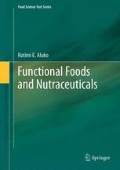Abstract
Health-promoting effects of soybean seeds are due to the content and type of proteins and polyphenolic compounds (mainly isoflavones). Initial health claim associated with soybean proteins suggested benefits in reducing the incidence and severity of cardiovascular diseases. These health benefits are due to the ability of soybean protein-derived peptides to downregulate hepatic cholesterol synthesis and reduce plasma content of total lipids. The indigestible portion of soybean proteins is believed to entrap cholesterol within the intestinal lumen and prevents reabsorption into the blood circulation. Soybean proteins also increase plasma antioxidant capacity, which reduces lipid oxidation and associated peroxide-induced damage to tissue and organ functions. This is especially the case with soybean protease inhibitors that contain high contents of sulfur groups known to be excellent scavengers of toxic free radicals. Soybean also contains lunasin, which has anticancer properties through its ability to downregulate production of pro-inflammatory cytokines. Soybean isoflavones have estrogen-like structure and may stimulate hormone-induced physiological changes in the body. The isoflavones have beneficial effects in reducing bone mineral loss and may reduce the negative symptoms associated with menopause. Anticancer effects of soybean isoflavones are due to upregulation of apoptotic pathway and suppression of prostaglandin synthesis. In kidney diseases, dietary soybean proteins can induce change in prostanoid synthesis that benefits increase renal vasodilation.
Access this chapter
Tax calculation will be finalised at checkout
Purchases are for personal use only
Bibliography
Aukema, H.M., and I. Housini. 2001. Dietary soy protein effects on disease and IGF-1 in male and female Han:SPRD-cy rats. Kidney International 59: 52–61.
Aukema, H.M., J. Gauthier, M. Roy, Y. Jia, H. Li, and R.E. Aluko. 2011. Distinctive effects of plant protein sources on renal disease progression and associated cardiac hypertrophy in experimental kidney disease. Molecular Nutrition & Food Research 55: 1044–1051.
Azadbakht, I., R. Shakerhosseini, S. Atabak, M. Jamshidian, Y. Mehrabi, and A. Esmaill-Zadeh. 2003. Beneficiary effect of dietary soy protein on lowering plasma levels of lipid and improving kidney function in type II diabetes with nephropathy. European Journal of Clinical Nutrition 57: 1292–1294.
Cahill, L.E., C.Y.-C. Peng, N. Bankovic-Calic, D. Sankaran, M.R. Ogborn, and H.M. Aukema. 2007. Dietary soya protein during pregnancy and lactation in rats with hereditary kidney disease attenuates disease progression in offspring. The British Journal of Nutrition 97: 77–84.
Castiglioni, S., C. Manzoni, A. D’Uva, R. Spiezie, E. Monteggia, G. Chiesa, C.R. Sirtori, and M.R. Lovati. 2003. Soy proteins reduce progression of a focal lesion and lipoprotein oxidability in rabbits fed a cholesterol-rich diet. Atherosclerosis 171: 163–170.
Dia, V.P., S. Torres, B.O. de Lumen, J.W. Erdman, and E.G. de Mejia. 2009. Presence of lunasin in plasma of men after soy protein consumption. Journal of Agricultural and Food Chemistry 57: 1260–1266.
Friedman, M., and D.L. Brandon. 2001. Nutritional and health benefits of soy proteins. Journal of Agricultural and Food Chemistry 49: 1069–1086.
Hernandez-Ledesma, B., C.-C. Hsieh, and B.O. de Lumen. 2009. Antioxidant and anti-inflammatory properties of cancer preventive peptide lunasin in RAW 264.7 macrophages. Biochemical and Biophysical Research Communications 390: 803–808.
Hodis, H.N., W.J. Mack, N. Kono, S.P. Azen, D. Shoupe, J. Hwang-Levine, D. Petitti, L. Whitfield-Maxwell, M. Yan, A.A. Franke, and R.H. Selzer. 2011. Isoflavone soy protein supplementation and atherosclerosis progression in healthy postmenopausal women. A randomized controlled trial. Stroke 42: 3168–3175.
Hsieh, C.-C., B. Hernandez-Ledesma, and B.O. de Lumen. 2010. Soybean peptide lunasin suppresses in vitro and in vivo 7,12-dimethylbenz-[a]anthracene-induced tumorigenesis. Journal of Food Science 75: H311–H316.
Hwang, S.-Y., C.G. Taylor, P. Zahradka, D. Bankovic-Calic, M.R. Ogborn, and H.M. Aukema. 2008. Dietary soy protein reduces early renal disease progression and alters prostanoid production in obese fa/fa Zucker rats. The Journal of Nutritional Biochemistry 19: 255–262.
Li, Y., D. Kong, B. Bao, A. Ahmad, and F.H. Sarkar. 2011. Induction of cancer cell death by isoflavone: the role of multiple signaling pathways. Nutrients 3: 877–896.
Ma, D.-F., L.-Q. Qin, P.-Y. Wang, and R. Katoh. 2008. Soy isoflavone intake inhibits bone resorption and stimulates bone formation in menopausal women: meta-analysis of randomized controlled trials. European Journal of Clinical Nutrition 62: 155–161.
Ogborn, M.R., E. Nitschmann, N. Bankovic-Calic, H. Weiler, and H.M. Aukema. 2010. Dietary soy protein benefit in experimental kidney disease is preserved after isoflavone depletion of diet. Experimental Biology and Medicine 235: 1315–1320.
Omoni, A.O., and R.E. Aluko. 2005. Soybean foods and their benefits: potential mechanisms of action. Nutrition Reviews 63: 272–283.
Peng, C.Y.-C., D. Sankaran, M.R. Ogborn, and H.M. Aukema. 2009. Dietary soy protein selectively reduces renal prostanoids and cyclooxygenases in polycystic kidney disease. Experimental Biology and Medicine 234: 737–743.
Siepmann, T., J. Roofeh, F.W. Kiefer, and D.G. Eldelson. 2011. Hypogonadism and erectile dysfunction associated with soy product consumption. Nutrition 27: 859–862.
Sirtori, C.R., C. Galli, J.W. Anderson, and A. Arnoldi. 2009. Nutritional and nutraceutical approaches to dyslipidemia and atherosclerosis prevention: focus on dietary proteins. Atherosclerosis 203: 8–17.
Swami, S., A.V. Krishnan, J. Moreno, R.B. Bhattacharyya, D.M. Peehl, and D. Feldman. 2007. Calcitriol and genistein actions to inhibit the prostaglandin pathway: potential combination therapy to treat prostate cancer. The Journal of Nutrition 137: 205S–210S.
Williamson, C. 2007. Health effects of soya- cause for concern? Nutrition Bulletin 32: 6–11.
Yang, H.-Y., Y.-H. Tzeng, C.-Y. Chai, A.-T. Hsieh, J.-R. Chen, L.-S. Chang, and S.-S. Yang. 2011. Soy protein retards the progression of non-alcoholic steatohepatitis via improvement of insulin resistance and steatosis. Nutrition 27: 943–948.
Author information
Authors and Affiliations
Rights and permissions
Copyright information
© 2012 Springer Science+Business Media, LLC
About this chapter
Cite this chapter
Aluko, R. (2012). Soybean. In: Functional Foods and Nutraceuticals. Food Science Text Series. Springer, New York, NY. https://doi.org/10.1007/978-1-4614-3480-1_5
Download citation
DOI: https://doi.org/10.1007/978-1-4614-3480-1_5
Published:
Publisher Name: Springer, New York, NY
Print ISBN: 978-1-4614-3479-5
Online ISBN: 978-1-4614-3480-1
eBook Packages: Chemistry and Materials ScienceChemistry and Material Science (R0)

